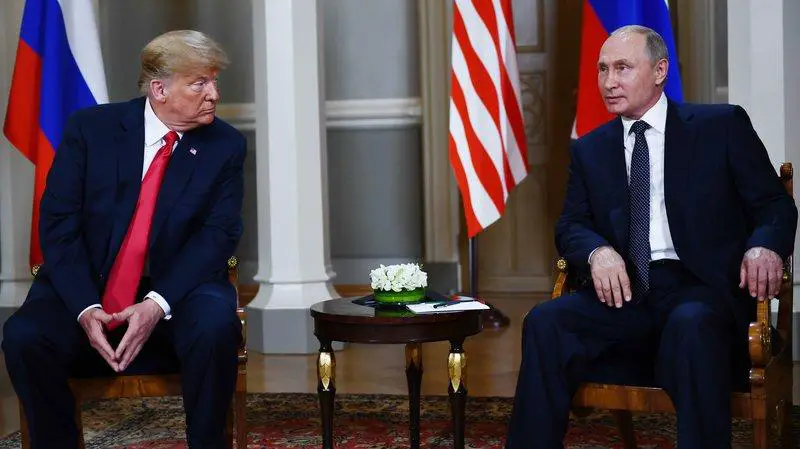Donald Trump takes every opportunity to try to discredit Robert Mueller’s probe of the 2016 election. That’s because he’s afraid his unlikely election will be put into question. That’s the past. The rest of the GOP should be working like crazy to stop Russian meddling, now. Because the Russians want to disrupt American politics, and they’re not going to accomplish that by helping the party that runs all three branches of government and most of the states.
If the Russians get involved in 2018, it will be to help the Democrats, according to Politico. And considering Russia’s success in 2016, the Chinese and Iranians may also get into the act—and it won’t be to help Trump this time.
What makes the American government’s ongoing inaction—and the general myopia on Capitol Hill and at the White House around the cyber threat—so stunning is the simple fact that the Republicans in charge of the executive and legislative branches should be terrified that they’re next. . .
Vladimir Putin’s goal isn’t—and never was—to help the Republican Party, at least in the long run. . . “Their purpose was to sow discontent and mistrust in our elections; they wanted us to be at each others’ throat when it was over,” former chairman of the House Intelligence Committee Mike Rogers said last year. . .
The next round of election attacks may not even stem from Russia. . . There’s a good argument to be made that China, for one, might look at our congressional elections and think that helping the Democrats in 2018 would be best for them. . .
One way for China to extend the period of a vacuum of American leadership: Throw the Senate to the Dems, ensuring not just two years of oversight hearings but also fraught nomination fights that would leave the government understaffed and under-resourced and unable to engage thoughtfully with the rest of the world. . .
One way for China to extend the period of a vacuum of American leadership: Throw the Senate to the Dems, ensuring not just two years of oversight hearings but also fraught nomination fights that would leave the government understaffed and under-resourced and unable to engage thoughtfully with the rest of the world.
[One way for China to extend the period of a vacuum of American leadership: Throw the Senate to the Dems, ensuring not just two years of oversight hearings but also fraught nomination fights that would leave the government understaffed and under-resourced and unable to engage thoughtfully with the rest of the world.]
The National Review agrees.
Moscow will probably conclude that a Democratic candidate’s victory would be better for its interests. Thus, Republicans have a strong incentive to push for cybersecurity and other anti-meddling measures, lest they find themselves on the losing end of foreign-intelligence plots to sway elections.
But Russian mischief may not be limited to undermining Republicans.
Now, in this 2018-midterm election season, as some predict a blue wave of resistance to Trump, his policies and alarming authoritarianism, Republicans want to split up the Democratic political opposition and divide black and Latino voters. And Russia looks like it wants to help here, too. But this time it won’t work.
The most recent example of this strategy is the #WalkAway hashtag, which is presented as a grassroots effort by former Democrats who are critical of the party’s alleged intimidation, confrontation and lack of civility and want people to walk away from the party.
However, #WalkAway has also now been connected to Kremlin-linked Russian bots, and it is now the seventh most popular Russia-influenced hashtag as of this writing, according to the website Hamilton 68, which tracks Russian influence on Twitter as part of the Alliance for Securing Democracy, an initiative of the nonpartisan German Marshall Fund. The purpose of this now-astroturf campaign is to manipulate public opinion by creating the illusion that this is a popular movement. In reality, #WalkAway has become pure propaganda, a psychological operation.
Fortune Magazine is reporting that the Russians have already meddled in three contests in 2018.
A group of hackers believed to be tied to Russia’s military have launched spear-phishing campaigns against at least three candidates running for election in 2018, a Microsoft executive said Thursday. . .
Tom Burt, a vice president for customer security at Microsoft . .didn’t disclose the names of the candidates targeted by the hackers, but said they were running for reelection and added, “They were all people who, because of their positions, might have been interesting targets from an espionage standpoint as well as an election disruption standpoint.”
So, how have Republicans responded to the threat? Not very well, according to the Chicago Tribune.
House Republicans on Thursday approved a spending bill that excludes new money for election security grants to states, provoking a furious reaction from Democrats amid a national controversy over Russian election interference.
Trump’s stated purpose for cozying up to Russia’s Vladimir Putin is that former enemies can become friends. Maybe so, but in this case, Republican candidates this year should remember that former allies (the Russin hackers) might just become their worst nightmare.
Donate Now to Support Election Central
- Help defend independent journalism
- Directly support this website and our efforts
